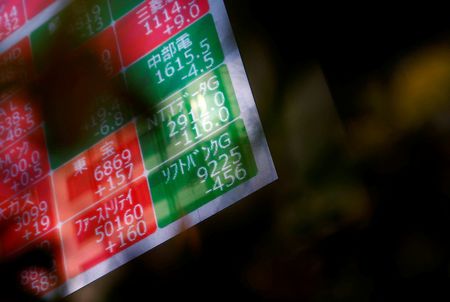By Stephen Culp
NEW YORK (Reuters) -Wall Street ended sharply lower and benchmark Treasury yields jumped on Friday in the wake of a mixed U.S. payrolls report, weak consumer sentiment data and revived trade war jitters.
All three major U.S. stock indexes finished steeply lower in a broad selloff that accelerated after a report that U.S. President Donald Trump will shortly announce new tariffs.
The indexes all notched losses on the week.
The much-anticipated employment report showed the U.S. added 143,000 jobs in January, 53.4% fewer than December’s upwardly revised 307,000.
The report, distorted by annual benchmark revisions, along with California wildfires and unusually cold weather, also showed hotter-than-expected wage growth and a surprise dip in the unemployment rate, to 4.0% from 4.1%.
“It’s a mixed bag” of data to digest, said Rob Williams, chief investment strategist at Sage Advisory Services in Austin, Texas.
“It was a miss on the headline, but the revisions over the last two months were positive, and hourly earnings were also up.”
A separate report from the University of Michigan showed consumer sentiment has darkened unexpectedly this month as inflation expectations spiked.
The major indexes extended losses after Trump said he will announce a new round of reciprocal tariffs on many countries next week.
“Anytime you play a game of chicken which is very clearly what Trump is doing,” said Michael Green, chief strategist at Simplify Asset Management in Philadelphia, “What if somebody decides to go too far and we end up with a car crash?”
“Ultimately, what Trump is taking advantage of is a very unbalanced negotiation at the end of the day, the customer is always right,” Green added. “And for the vast majority of the world, the U.S. is the primary customer.”
Late Thursday, Amazon reported disappointing growth in its cloud computing segment and lower-than-expected first quarter revenue and profit.
Similar disappointments from Microsoft and Alphabet earlier in the week fueled suspicions the megacap tech and tech-adjacent stocks are losing momentum.
The Dow Jones Industrial Average fell 444.23 points, or 0.99%, to 44,303.40, the S&P 500 fell 57.58 points, or 0.95%, to 6,025.99 and the Nasdaq Composite fell 268.59 points, or 1.36%, to 19,523.40.
European shares followed U.S. stocks lower as investors grew increasingly skittish over the possibility of an escalating trade war, while a dire profit warning forecast from Porsche further dampened risk appetite.
MSCI’s gauge of stocks across the globe fell 6.14 points, or 0.70%, to 869.20.
The STOXX 600 index fell 0.38%, while Europe’s broad FTSEurofirst 300 index fell 8.54 points, or 0.39%Emerging market stocks rose 4.06 points, or 0.37%, to 1,106.31. MSCI’s broadest index of Asia-Pacific shares outside Japan closed higher by 0.39%, to 582.30, while Japan’s Nikkei fell 279.51 points, or 0.72%, to 38,787.02.
U.S. Treasury yields rose on the strength of upward revisions to previous-month job adds and a surprise decline in the unemployment rate, despite the job report’s disappointing headline number.
The yield on benchmark U.S. 10-year notes rose 4.7 basis points to 4.485%, from 4.438% late on Thursday.The 30-year bond yield rose 3.9 basis points to 4.6856% from 4.647% late on Thursday.
The 2-year note yield, which typically moves in step with interest rate expectations for the Federal Reserve, rose 7.7 basis points to 4.285%, from 4.208% late on Thursday.
The dollar gained ground in choppy trading in the wake of the jobs report, which appeared to support the U.S. Federal Reserve’s rationale for holding off on rate cuts for the time being.
The dollar index, which measures the greenback against a basket of currencies including the yen and the euro,rose 0.36% to 108.05, with the euro down 0.51% at $1.0328.
The Japanese yen strengthened 0.12% against the greenback to 151.27 per dollar.
Sterling weakened 0.24% to $1.2404.
The Mexican peso < MXN=> weakened 0.28% versus the dollar at 20.529.
The Canadian dollar strengthened 0.23% versus the greenback to C$1.43 per dollar.
In cryptocurrencies, bitcoin fell 0.86% to $95,986.52. Ethereum declined 3.73% to $2,607.61.
Oil prices advanced after new sanctions were imposed on Iran’s crude exports, but remained on track for their third consecutive weekly decline due to tariff worries.
U.S. crude rose 0.55% to settle at $71.00 per barrel, while Brent settled at $74.66 per barrel, up 0.50% on the day.
Gold resumed its uphill climb as renewed trade jitters added luster to the safe-haven metal.
Spot gold rose 0.13% to $2,860.18 an ounce. U.S. gold futures rose 0.26% to $2,863.50 an ounce.
(Reporting by Stephen Culp, additional reporting by Amanda Cooper; Editing by Nia Williams and David Gregorio)










